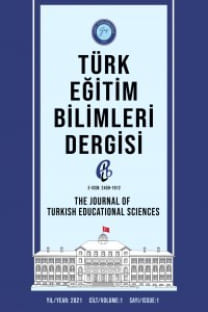İFADE EDİCİ DİL BECERİLERİ SINIRLI OLAN ZİHİNSEL ENGELLİ ÇOCUKLARIN DİL GELİŞİMLERİNİ DESTEKLEMEK İÇİN ÖĞRETMENİN SINIF ORTAMINDA YAPACAKLARI
Yetersizlikten etkilenmiş çocuklar için ana dilinin kazanımı sorunlu olabilecek alanlardan biridir. Çeşitli derecelerde zihinsel yetersizlikten etkilenmiş çocuklarda hem alıcı hem de ifade edici dil gelişimlerinde problemler görülebilir. Yakın geçmişten günümüze kadar yapılan araştırmalarda sosyal etkileşimci teorinin temellerine dayanan doğal dil sağaltım yaklaşımının yetersizlikten etkilenmiş çocuklara ana dilinin kazandırılmasında etkili olduğu görülmektedir. Bu çalışmada, sınırlı ifade edici dil becerileri olan zihinsel engelli çocukların ifade edici dilini geliştirmek için doğal dil yaklaşım teknikleri temel alınarak öğretmenin sınıf ortamında yapması gerekenler açıklanmıştır. Çalışmada çocukların dil gelişimini desteklemek amacıyla aktivite önerileri de yer almaktadır.
Anahtar Kelimeler:
Dil edinimi, zihinsel engelli, doğal dil yaklaşımı
WHAT THE TEACHER SHOULD DO IN THE CLASSROOM ENVIRONMENT IN ORDER TO HELP THE MENTALLY HANDICAPPED CHILDREN WITH LIMITED COMMUNICATIVE LANGUAGE SKILLS TO IMPROVE THEIR LANGUAGE
Mother tongue acquision is one of the potential problem areas for children suffering from disability. It is possible for children suffering from various degrees of mental disability to have problems in the development of both their receptive and their productive language skills. Recent research shows that the naturalistic approach to the betterment of their language, based on the social interaction theories, has been effective in the teaching of their mother tongue to the mentally handicapped children. In this study, based on the techniques of the naturalistic approach, what the teacher should do in the classroom environment in order to help the mentally handicapped children to develop their communicative language skills has been explained. The study also covers a range of activities suggested to help these children to improve their language skills
- Başlangıç: 2003
- Yayıncı: ANKARA HACI BAYRAM VELİ ÜNİVERSİTESİ
Sayıdaki Diğer Makaleler
ALTINCI SINIF ÖĞRENCİLERİNİN KİŞİLER ARASI PROBLEM ÇÖZME BECERİ ALGILARI
MÜLKİYELİ BİR EĞİTİM BİLİMCİ: İHSAN SUNGU
TÜRK MİLLÎ EĞİTİMİNDEN FELSEFÎ BİR KESİT
İŞGÖRENLERİN ÖRGÜTE UYUMU (ÖRGÜTSEL SOSYALİZASYON)
Fizik Öğretimi Uygulamalarında Karşılaşılan Güçlükler
Ali Rıza AKDENİZ, Orhan KARAMUSTAFAOĞLU
İLKÖĞRETİM OKULLARINDA GÖREV YAPAN YÖNETİCİ VE ÖĞRETMENLERİN ÖĞRENEN ORGANİZASYONA İLİŞKİN ALGILARI
